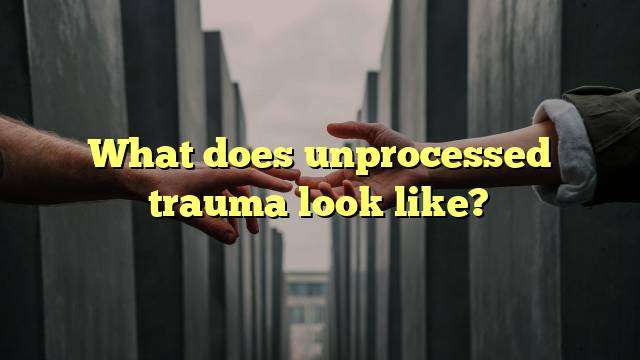What is Unprocessed Trauma?
Unprocessed trauma is an emotional and psychological response to a traumatic event. It is the lingering and unresolved impact of a traumatic event and is often associated with feelings of fear, guilt, helplessness, and confusion. Trauma can be caused by physical, emotional, or psychological experiences, such as a car accident, natural disaster, physical assault, or the death of a loved one. Unprocessed trauma can lead to a wide range of physical, emotional, and psychological symptoms, including intrusive thoughts about the event, difficulty sleeping, mood swings, flashbacks, anxiety, and depression.
Signs and Symptoms of Unprocessed Trauma
When someone has unprocessed trauma, they often experience a wide range of physical, emotional, and psychological symptoms. The most common signs and symptoms include:
- Intrusive thoughts: Unprocessed trauma can cause people to experience intrusive thoughts and memories of the traumatic event. These intrusive thoughts can be overwhelming and can lead to increased anxiety and distress.
- Mood swings: People with unprocessed trauma often experience sudden and extreme changes in their mood. These mood swings can range from feeling overwhelmed and anxious to feeling angry and irritable.
- Sleep disturbances: Unprocessed trauma can cause sleep disturbances, such as difficulty falling asleep or staying asleep. This can lead to fatigue, which can further compound the emotional and psychological symptoms of unprocessed trauma.
- Flashbacks: Flashbacks are intense memories of the traumatic event that can cause the person to feel as if the event is happening again. These flashbacks can be distressing and can lead to feelings of fear and helplessness.
- Anxiety and depression: Unprocessed trauma can lead to anxiety and depression. These feelings can be overwhelming and can interfere with daily life.
- Avoidance: People with unprocessed trauma often try to avoid talking or thinking about the traumatic event. This can lead to isolation, withdrawal, and difficulty forming relationships.
- Loss of interest: Unprocessed trauma can lead to a loss of interest in activities that used to be enjoyable. This can lead to feelings of hopelessness and despair.
How to Cope with Unprocessed Trauma
There are a number of strategies that can help someone cope with unprocessed trauma. These strategies include:
- Seek professional help: It is important to seek professional help to address unprocessed trauma. A therapist can provide support and guidance in working through the traumatic event and in developing healthier coping skills.
- Practice self-care: Self-care is essential in managing unprocessed trauma. This can include practicing relaxation techniques, engaging in physical activity, and taking time to do activities that bring joy.
- Create a support network: It is important to have a strong support network of family and friends who can offer emotional and practical support. This can help to reduce feelings of isolation and helplessness.
- Stay connected: It is important to stay connected with people and activities that bring joy. This can help to reduce feelings of loneliness and can provide a sense of purpose and meaning.
- Set boundaries: It is important to establish and maintain healthy boundaries with others. This can help to protect against further trauma and can help to create a sense of safety and security.
- Be mindful: Practicing mindfulness can help to reduce stress and anxiety. Mindfulness is a practice of being present and aware of one’s thoughts, feelings, and sensations in the moment.
- Seek out activities that bring joy and satisfaction: Engaging in activities that bring joy and satisfaction can help to reduce symptoms of unprocessed trauma. These activities can be anything from reading a book to taking a walk in nature.
Conclusion
Unprocessed trauma can have a profound impact on someone’s life. It can cause a wide range of physical, emotional, and psychological symptoms and can lead to feelings of fear, guilt, helplessness, and confusion. Fortunately, there are a number of strategies that can help someone cope with unprocessed trauma. These strategies include seeking professional help, practicing self-care, creating a support network, staying connected, setting boundaries, practicing mindfulness, and seeking out activities that bring joy and satisfaction. By utilizing these strategies, it is possible to manage unprocessed trauma and to live a more fulfilling and meaningful life.



